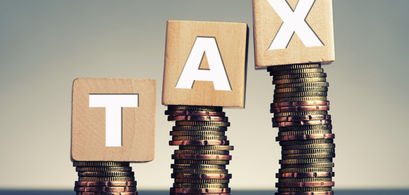The UK’s latest Chancellor, Jeremy Hunt, is set to announce tax increases of £20bn this coming Thursday, amidst an expected £35bn cut in spending to tackle the major economic uncertainties plaguing the country.
With the exact details still unknown, millions are left fearing just how high taxes will go. Here, MoneyTransfers.com has compared tax rates around the world to see what the future could hold for the UK.
Jonathan Merry, CEO of MoneyTransfers.com, says:
“Tax rises and cuts in spending may be considered an essential sacrifice all households need to make in face of Britain’s turbulent economic situation, but the fact remains that many vulnerable households are already facing fuel poverty and rising costs, and these members of our society need to be protected urgently.
While the UK may be considered to tax fairly lightly in comparison to many European countries, it’s clear that with spending cuts also due, a rise in taxes is not going to deliver the same quality of social services and quality as some higher-tax systems in the EU.”
Tax Comparisons Around the World
| Country | Tax Level | Average Tax Percentage |
|---|---|---|
| United States | 10 – 37% | 24% |
| Canada | 15 – 33% | 26% |
| United Kingdom | 20 – 45% | 28% |
| Germany | 14 – 42% | 29% |
| France | 14 – 45% | 30% |
| Italy | 23 – 43% | 32% |
| Spain | 19 – 47% | 34% |
| Australia | 0 – 45% | 32% |
| Japan | 10 – 45% | 30% |
| India | 0 – 30% | 24% |
| Brazil | 0 – 27.5% | 24% |
| China | 5 – 45% | 26% |
| Russia | 13 – 30% | 23% |
| Mexico | 0 – 35% | 27% |
| New Zealand | 10 – 33% | 27% |
1. United States: 10 – 37%
The United States has a progressive tax system which is managed at both a federal and a state level. People with higher incomes pay a higher percentage of their income in taxes than those with lower incomes. The federal income tax rate ranges from 10% to 37%, with the average American paying an estimated 24% of their income in taxes.
This consists of several other taxes paid at the state and local level, including sales tax and property taxes. It’s important to note that while tax in the US may look lower on the surface, Americans do not pay for healthcare through their taxes. The US is also the only country in the world in which you are taxed on your citizen status, not where you live – so US citizens living abroad are still subject to US taxes!
2. Canada: 15 – 33%
Canada also taxes people dependent on their income, with federal tax rates ranging from 15% to 33%. It’s estimated that the average Canadian pays about 26% of their income in taxes.
Canada’s tax system consists of federal, provincial, and municipal taxes. Like the US, Canada has a sales tax that is applied to most goods and services, as well as property taxes on real estate.
3. United Kingdom: 20 – 45%
The United Kingdom also has a progressive tax system, with tax rates ranging from 20% to 45% – already some of the highest in the world. The average British taxpayer pays about 28% of their income in taxes.
This includes income tax, value-added tax, social security contributions, and property taxes. Additionally, most goods and services in the UK are subject to a sales tax.
4. Germany: 14 – 42%
Germany has one of the highest tax systems in the world, with progressive tax rates ranging from 14% to 42%. The average German taxpayer pays about 29% of their income in taxes.
Among these are income taxes, social security contributions (such as pensions, unemployment insurance, and health insurance), and property taxes. The majority of goods and services in Germany are subject to a sales tax, just as they are in the US and Canada.
5. France: 14 – 45%
France also has a progressive tax system, with tax rates ranging from 14% to 45%. The average French taxpayer is thought to pay around 30% of their income in taxes.
This consists of income tax, social security contributions, property taxes, and a value-added tax that is applied to most goods and services. France’s social security contributions are considered amongst the highest taxes in the world – but as a result, the country’s social security systems are also considered amongst the most open-handed.
6. Italy: 23 – 43%
Italy’s tax system ranges from 23% to 43%. The average Italian taxpayer pays about 32% of their income in taxes.
Taxes in Italy are levied by both the central and regional governments, and collected by the Italian Agency of Revenue.
7. Spain: 19 – 47%
Spain’s tax rates range from 19% to 47%. The average Spanish taxpayer pays an estimated 34% of their income in taxes.
Residents and non-residents in Spain are subject to income tax, social security contributions, property taxes, and tax on dividends, capital gains, and interest. Taxes are levied by local, regional, and national governments.
8. Australia: 0 – 45%
Australia, like many countries, uses a progressive tax system, with high earners paying tax rates of up to 45% – and rates starting from 0% for low earners. The average Australian taxpayer pays about 32% of their income in taxes.
Australia uses a self-assessment system, which requires all individuals, trusts, companies, and other business organisations to report their own tax returns each year.
9. Japan: 10 – 45%
Taxes in Japan range from 10% to 45%. Taxes account for about 30% of the average Japanese taxpayer’s income.
Like most other developed countries, Japan also collects a value-added tax on most goods and services, as well as issuing income tax, property taxes, and social contributions (e.g. free healthcare).
10. India: 0 – 30%
India’s tax rates range from 0% to 30%. Indian taxpayers pay about 22% of their income in taxes.
The progressive tax system includes income tax, social security contributions for defence, police, healthcare, infrastructure, etc, and property taxes. India also collects a value-added tax on most goods and services.
11. Brazil: 0 – 27.5%
Brazil also uses progressive tax system for their economy, with tax rates ranging from 0% to 27.5%. The average Brazilian taxpayer pays about 24% of their income in taxes.
12. China: 5 – 45%
China’s tax rates range from 5% to 45%, using a progressive system based on each person’s income. The average Chinese taxpayer pays about 26% of their income in taxes.
13. Russia: 13 – 30%
Russia’s tax system’s rates range from 13% to 30%. The average Russian taxpayer pays about 23% of their income in taxes.
Citizens are taxed for income, social contributions, properties, as well as VAT for goods and services purchased.
14. Mexico: 0 – 35%
Mexico taxes people living in the country between 0% and 35%, depending on their income level. The average Mexican taxpayer pays about 27% of their income in taxes.
Non-residents working in Mexico pay between 15 – 30%, while Mexico’s corporation tax is set at a flat rate of 30%.
15. New Zealand: 10 – 33%
Finally, New Zealand also has a progressive tax system, with tax rates ranging from 10% to 33%. The average New Zealand taxpayer pays about 27% of their income in taxes.
Global tax comparisons: final thoughts
While the progressive tax system may seem like a burden for many people, it’s by far and away the most commonly used system for taxing people according to their income. Tax is an important tool for funding critical government services and ensuring that everyone contributes to society in some way. Whether you’re living in the United States, Canada, the United Kingdom, Germany, France, Italy or Spain, you’ll likely be paying somewhere between 20% and 50% of your income in taxes.
Notably, many of the countries with higher taxation are also thought to have better health care, infrastructure, and other social services.
As you can see, there is a vast range of tax rates around the world. Whether you’re in one country or another, it’s important to stay informed about the tax system and how it affects your income. Plus, being educated about your country’s tax system means you know what bracket you fall into.
Contributors








.svg)









.jpg)

